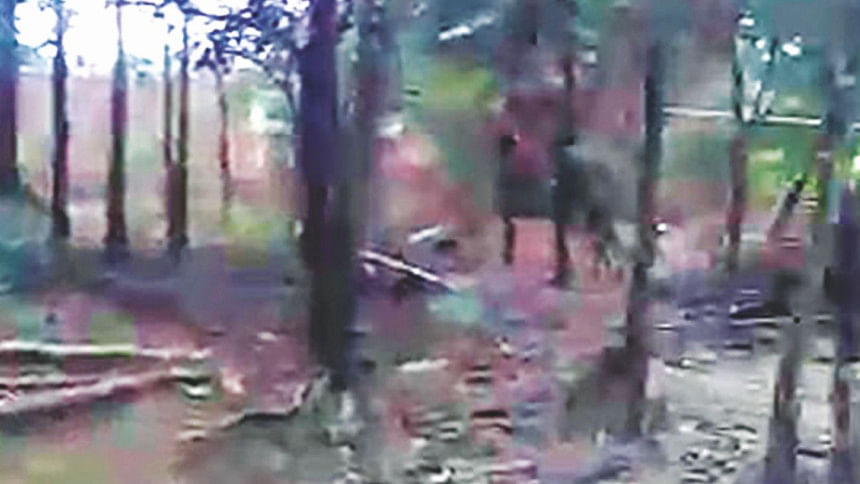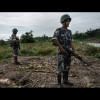Myanmar destroying massacre evidence

The Myanmar government is bulldozing over the site of a Rohingya mass grave in an effort to destroy evidence of a massacre committed by the military last year, says a rights group.
The claim follows investigations carried out by the Associated Press and Reuters, which revealed evidence of other mass graves.
The Arakan Project, which uses on-the-ground networks to document abuses against the Rohingyas in Rakhine, provided British newspaper The Guardian with a video of the grave site before its destruction.
The footage shows half-buried tarpaulin bags in a forest clearing, with a decaying leg visibly protruding from one of the bags, said a report of The Guardian on Tuesday.
Chris Lewa, director of the project, said the bulldozing appeared to be part of an effort to permanently conceal evidence of the grave following the media reports.
“Two of the mass grave sites we know about have appeared in the media, but on Thursday one of the other mass grave sites was bulldozed. This means that evidence of the killings is being destroyed.
“Private companies are doing the bulldozing. They come from central Myanmar, not Rakhine,” Lewa said.
“It is clear this is happening under the orders of government,” noted the project director.
The reported mass grave site in Maung Nu of Buthidaung township in northern Rakhine was the location of a massacre which took place in August last year, according to reports of rights groups.
Human Rights Watch (HRW) said survivors had told them the army had “beaten, sexually assaulted, stabbed, and shot villagers who had gathered for safety in a residential compound” in the village. Dozens were said to have been killed.
Satellite imagery obtained by the HRW showed that Maung Nu had been razed in the aftermath.
The Doctors Without Borders in December last year said the Myanmar security forces killed at least 6,700 Rohingyas in one month following their crackdown in Rakhine in late August last year.
Around 700,000 Rohingyas have taken shelter in Bangladesh since the crackdown began, and the influx, though slow, still continues.
Myanmar has all along refuted the allegations of ethnic cleansing. Late last year, an army probe into its own conduct during the 2017 crackdown exonerated itself of any blame.
However, in a surprise move last month, the Myanmar military admitted that the Rohingyas found in a mass grave at the village of Inn Din had been killed by its soldiers.
Last week, Yanghee Lee, the UN special rapporteur for human rights in Myanmar, said the crisis had the “hallmarks of genocide”.
The UN official, who is leading a UN fact-finding mission, has been barred from entering Myanmar.
Talking to The Guardian, HRW Deputy Asia Director Phil Robertson said, “We have heard about the allegations of the destruction at Maung Nu and we are concerned that this could be part of broader efforts to conceal the atrocities committed by Burmese security forces.”
Other parts of Rakhine appear to have been bulldozed, according to an AFP report last week, which contained aerial photographs showing former Rohingya villages completely flattened.
The bulldozing appeared to target villages that had been razed during last year's military crackdown, mentioned the report.
Lewa said, “The bulldozers are destroying not just parts of some villages that were burned but also parts where houses were abandoned but still intact.”
Asked about the reported bulldozing of Rohingya villages, Myanmar government spokesperson Zaw Htay said, “Local government is clearing that area. No villagers there. No housing. Only plain land.”
He further said they have to “construct new villages there for the resettlement” of returning Rohingyas.
On reports of destroying the mass grave, Htay said, “I want to know what evidence you are talking about? Was it Arsa terrorist group? Bengali people around the world?
“Please give me the reliable, concrete, strong primary evidence, please -- not based on the talking story of Bengali people around the world, Bengali lobbyists,” he added.
UK MPS CALL FOR ICC REFERRAL
More than a hundred British lawmakers have called for an International Criminal Court (ICC) referral for Myanmar's military general Min Aung Hlaing over the security operations against the Rohingyas in Rakhine.
“It is time for the British government to unequivocally state that the situation in Myanmar should be referred to the International Criminal Court,” they said in a letter to British Foreign Secretary Boris Johnson yesterday.
The letter was signed by over a hundred MPs, including Labour Party Lawmaker Rushanara Ali.
They said the Myanmar military and General Min Aung Hlaing have paid no meaningful price for their “security operations”, and Hlaing's sense of impunity appears to be emboldening him.
“He [Hlaing] is aggressively escalating existing conflicts against other ethnic groups in the country, threatening the peace process,” the letter read.
It said the UK has so far shown diplomatic leadership by securing a statement from the UN Security Council and building international consensus on steps needed to be undertaken by Myanmar. However, the demands of the Security Council have largely been ignored.
“Now it is time to go further,” it said about the call for ICC referral for General Hlaing.
“Although at present such a step [ICC referral] would likely be opposed within the UN Security Council by Russia and China, we must work to build an international consensus to convince these countries to change their positions.”
This process should start with the British government ensuring that the European Union announces support for a referral to the ICC in the meeting of the EU Foreign Affairs council on February 26, the letter read.
“The more countries can be persuaded to support a referral, the more the sense of impunity with which General Min Aung Hlaing and his military operates will be reduced. This in turn may help prevent further military offensives against civilians.”
The British government should also work to secure agreement that the EU bans supply of all equipment to Myanmar military, and ends military training and cooperation programme, it mentioned.
The MPs also want a UN-mandated global arms embargo against Myanmar.

 For all latest news, follow The Daily Star's Google News channel.
For all latest news, follow The Daily Star's Google News channel. 








Comments